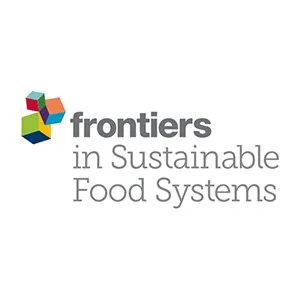Los investigadores Mayarí Castillo y Rodrigo Pérez del CEAS, junto al académico Andrés Silva de la Universidad San Sebastián, participaron como editores de un número especial de la revista Frontiers in Sustainable Food Systems, titulado "Food Consumption Disparities, Public Health and Sustainability in Latin America and the Caribbean". El número, que contiene 10 artículos e integra investigaciones realizadas por numerosos investigadores para diversos países de la región, indaga temas como la disparidad en el acceso a alimentos, el consumo de alimentos no saludables, los métodos de recolección de datos nutricionales y de consumo, así también cómo la producción de alimentos y la sostenibilidad del sistema agrícola en general. El número especial, así cómo todos los artículos, están completamente abiertos y de acceso libre en: https://www.frontiersin.org/re...
La editorial "Food Consumption Disparities, Public Health and Sustainability in Latin America and the Caribbean" (Silva et al. 2023)
One of the central challenges of the world and, particularly for Latin America, has been the production, distribution, and equitable consumption of food. This challenge has become more complex, for a series of changes at the societal level such as urbanization, changes in the patterns of organization of domestic and unpaid work and increased income. These changes, among other issues, have been associated with increased consumption of ultra-processed foods of low nutritional value such as sugary drinks. On the contrary, adequate consumption of foods, such as fruit and vegetables, is linked with a lower risk of cardiovascular diseases and stroke, decreased risk of depression, and increased natural immunity, among other important health- and wellbeing-related aspects. Accordingly, public authorities have been historically interested in identifying policies that can increase healthy and sustainable food consumption. Knowing social determinants of dietary decisions can be a contribution for designing food policies oriented to increase healthy food intake and reduce nutrition and health disparities, while promoting sustainable production and consumption.
This Research Topic entitled “Food consumption disparities, public health and sustainability in Latin America and the Caribbean” aims at contributing to the understanding of dynamics associated with food production, the consumption of healthy diets and the sustainability of food systems in the region. To that end, it presents a broad array of topics, methodological approaches and analyses in different countries of Latin America and the Caribbean: Using data from Costa Rica, Dal et al. use a QUAIDS model to estimate food elasticities and provide results that encourage the generation of policies oriented to a significant price reduction in order to promote fruit and vegetable consumption. By contrast, Silva et al. use data from Colombia, Chile, Ecuador and Mexico, and take a more skeptical point of view regarding price policies. The authors argue that it is necessary to add the mental access dimension to the fruit and vegetable promotion discussion, as they found that consumers seemed satisfied with their fruit and vegetable intake, despite not consuming the quantities needed for a healthy diet. Within the same topic, Pinheiro et al. found that, whereas this is a national and a regional health issue, food insecurity is highly concentrated among poorer individuals, as prevalence is near twice in low-income population compared to national means in Chile.
From a food production point of view, sustainability in fruit and vegetable production means considering its economic, social and environmental impacts. The lack of sustainable production may also lead to relevant health disparities. The manuscript by Castillo et al. analyses the main impacts of the Productive Alliance Programme (PAP) in Chile, a government-mediated partnership between large agricultural companies and small farmers. The authors found that small farmers participating in the programme improve their managerial skills, increase their production, and reduce uncertainty, by simultaneously increasing food production sustainability. This last aspect is relevant as a significant proportion of the food produced globally is wasted or lost at some point during the food supply chain. By interviewing small farmers, Herrera-Quinteros and Jara-Rojas, show that a relevant part of the food produced is lost mostly during harvest, partially due to the way in which the commercialization process occurs, but also in response to what they refer to as cosmetic standards.
From the consumer side and considering both food quality and sustainability, Curi-Quinto et al. study the factors leading to a consumption of sustainable food diets among the Mexican population. The authors found that healthier and sustainable diets are consumed relatively more by rural inhabitants and disadvantaged households. However, the consumption of healthy and sustainable diets is still low across all population groups and areas of the country. Perhaps a solution to the access to more sustainable and healthy diets is presented in the work of Biskupovic et al., which compares the experiences of France and Chile with respect to the creation of community gardens and their impacts in food consumption, diets, and other outcomes related to the creation of social values. The authors found that community gardens promote ecological citizenship.
Finally, the COVID-19 pandemic has also produced several impacts. Using data from ten Latin American countries, Murillo et al., found that, despite college students having unhealthy dietary habits, among them there are important differences: after the COVID-19 pandemic, the ones who follow a plant-based diet, such as vegetarians and vegans, exhibit better scores and healthier dietary conducts. To that end, work environments could be an important aspect for the consumption of healthier diets. Using adult worker data from Chile, Tiboni-Oschilewski et al., found that people working from home perceive themselves as eating healthier, however, contrary to what one would have expected, they do not report they have been able to lose weight. In what regards to methods, the COVID-19 pandemic required the use of several online ways of collecting data. However, the validity of the data collected online, as used by several of the studies mentioned here, had not been studied. This is something Vega-Salas et al. did in the case of Peru. Their relevant methodological contribution shows that the use of an online food frequency questionnaire proves to provide consistent results.
We believe the manuscripts presented in this Research Topic make an contribution to advance the knowledge around food production and consumption, as well as the sustainability along the food supply chain, with an especial focus in Latin America. However, the results presented in these manuscripts are not only relevant to the Latin American context, but to other contexts, especially in developing regions of the world. The broad array of methods, from qualitative to quantitative and mixed approaches, and disciplines brought to this Research Topic, from health experts, sociologists, and economists, are also an contribution to science in general, as they emphasize how solutions cannot be thought as one-dimensional. We expect this Research Topic can not only contribute to science, but more importantly to the political discussion around food production, consumption, and the promotion of healthy diets in Latin America and the Caribbean.
Más información en: https://www.frontiersin.org/re...


